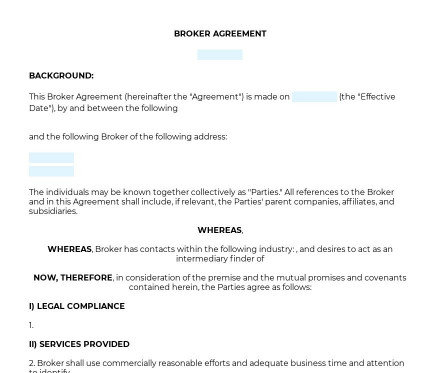Broker Agreement Free
With A Broker Agreement, it is possible to set forth the terms and conditions under which a Broker will either finds goods/services for a Buyer or interester buyer for goods/services being sold by a Seller.


 Template Overview
Template Overview
With A Broker Agreement, it is possible to set forth the terms and conditions under which a Broker will either finds goods/services for a Buyer or interester buyer for goods/services being sold by a Seller. The document specifies the relationship and the circumstances under which the Broker will receive a fee for their services.
In situations where a real estate agent wants to sell real property to a buyer on behalf of a client, a Real Estate Agent Agreement should be used instead of this document.
You fill out a form. The document is created before your eyes as you respond to the questions.
At the end, you receive it in Word and PDF formats. You can modify it and reuse it.
 How to use this template
How to use this template
The person filling the document will have to describe how much the Broker will be paid for making an introduction or facilitating a successful final deal. This agreement also includes the following details:
- The name of the Broker and the industry they work in;
- Who is requesting the Broker's services and whether they are a buyer or a seller;
- Whether the Broker will be finding interested buyers or sellers of goods, services, or both goods and services;
- Necessary licenses and qualifications for the Broker to operate in compliance with federal, state, and local laws;
- The Duration of the Agreement and the circumstances under which the Agreement will be automatically terminated;
- Whether payment of the Broker's fee depends on the success of a transaction after they make the introduction;
- How the Broker's fees will be determined and paid.
A completed document should be printed and signed by both parties. We recommend keeping copies in case any future disputes arise.
 Applicable law
Applicable law
In the US, both Federal and state laws cover Broker Agreements Federal laws may restrict what services can be contracted for and certain broad categories, like contracting for something that looks more like a business partnership than a Broker/Client relationship, but individual state laws may govern the interpretation of the contract in case of a dispute. Further, state-specific and industry-specific laws govern the licensing and qualification of Brokers in particular specialized industries. For example, in the real estate industry, the overwhelming majority of states dictate that a licensed realtor may not pay a non-licensed realtor a finder's fee. In the insurance industry, some states do not allow finder's fees.
Ready to build your document from this template?


 Please wait
Please wait
